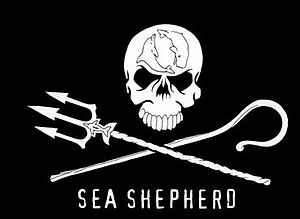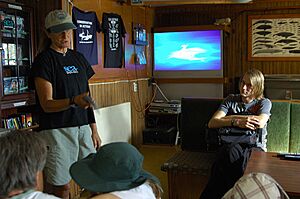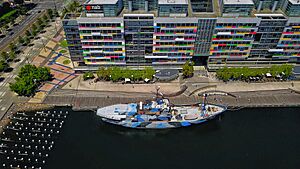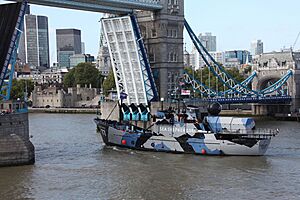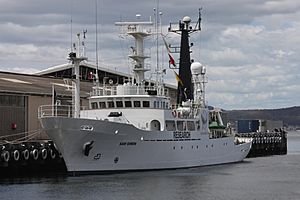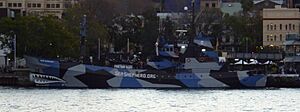Sea Shepherd Conservation Society facts for kids
| Founded | 1977 |
|---|---|
| Founder | Paul Watson |
| Type | Public charity (US); registered charity (UK) |
| Focus | Marine conservation activism |
| Location |
|
|
Area served
|
Global |
| Method | Direct action |
The Sea Shepherd Conservation Society (SSCS) is a group that works to protect ocean animals and their homes. It is a non-profit organization based in the United States. Sea Shepherd uses special methods to reach its goals. They send their ships to find and stop fishing boats that are doing illegal things. These illegal activities can harm marine life and make it hard for some species to survive.
Some environmental groups and governments have criticized Sea Shepherd's methods. For example, the Japanese government, whose whaling industry is often a target, has called Sea Shepherd's actions "eco-terrorism" because they try to stop their whaling.
Contents
History of Sea Shepherd's Work
The group that came before Sea Shepherd was started in 1977. Its founder, Paul Watson, left Greenpeace because he disagreed with their peaceful approach. Watson believed in taking more direct action.
In 1978, Watson got money to buy his first ship, the Sea Shepherd. The group's first mission was in 1979, to stop Canadian seal hunting. That same year, the Sea Shepherd also crashed into an illegal whaling ship called the Sierra. After this, the first Sea Shepherd ship had to be sunk. But Watson sold the story to get money for a new ship.
Throughout the 1980s, Sea Shepherd took part in many missions. They worked to protect marine life and stop illegal whaling by different countries.
Protecting Wildlife in the 1990s
In the 1990s, Sea Shepherd started to describe itself as an anti-poaching group. This meant they saw themselves as helping to enforce laws that protect the ocean. They also worked with other groups to stop harmful driftnet fishing. In 1994, Sea Shepherd sank an illegal Norwegian whaling ship. No charges were brought because the ship was involved in even more illegal activities than authorities expected.
Sea Shepherd's Missions in the 2000s and Beyond
In the early 2000s, Sea Shepherd helped clean up a big oil spill in Brazil. They also worked with governments to fight poaching at sea. For example, they helped in Costa Rica. In 2008, Sea Shepherd went to Antarctica twice to stop illegal whaling.
Since 2016, Sea Shepherd has worked more closely with governments. They help stop poaching in national waters and marine protected areas. They have worked with the Italian Coast Guard, the Mexican Navy, and the Coastguards of Gabon and São Tomé and Príncipe.
In late 2022, Paul Watson left Sea Shepherd Global. He said this was because the group was working more with governments instead of taking independent action. Watson then started new groups called the Captain Paul Watson Foundation and Sea Shepherd Origins. Some Sea Shepherd chapters, like those in France, the UK, and Brazil, decided to follow Paul Watson's new groups.
How Sea Shepherd Works
Sea Shepherd is a non-profit organization that focuses on the environment. In the United States, it has a special tax status. Most of the money Sea Shepherd gets goes directly to its programs. In 2019, about 90% of their money was used for their missions. Only a small part was spent on office costs and fundraising.
The group is known for being open about its finances. Sea Shepherd gets money from people and companies who donate. They also get money from Paul Watson's talks and online ads. The group is mostly run by volunteers, with a small paid staff. They try to keep their costs low for fundraising and hiring.
Sea Shepherd is guided by a group of leaders called a board of directors. They also have several advisory boards with experts in different areas. These boards include people who know about science, law, animal welfare, media, and finance.
Sea Shepherd's Direct Actions
Sea Shepherd uses protests and direct actions to protect ocean wildlife. Their missions have included stopping commercial fishing, shark poaching, shark finning, seal hunting, and whaling. They have been active in the South Pacific, the Mediterranean Sea, and around the Galapagos Islands.
Besides their actions at sea, Sea Shepherd also works on issues like plastic pollution. Chapters around the world organize beach cleanups to remove trash from oceans, streams, and rivers. In 2018, Sea Shepherd released a public announcement. It showed that over one million marine animals die each year from plastic trash.
Tactics Used by Sea Shepherd
Sea Shepherd's goal is to investigate, document, and act against illegal activities on the high seas. They record violations of conservation laws. They also use non-lethal tactics to stop illegal actions. These tactics include:
- Sinking or disabling whaling ships while they are in harbor.
- Stopping seal hunts in Canada and Namibia.
- Shining laser lights at whalers.
- Throwing bottles of foul-smelling acid onto ships at sea.
- Boarding whaling vessels to protest.
- Seizing and destroying illegal drift nets at sea.
Sea Shepherd believes these actions are needed because international groups have not been able to stop harmful whaling and fishing.
Challenges and Criticisms
Sea Shepherd staff and equipment have sometimes faced violence from the fishing industry. In 1998, some people threw rocks at Sea Shepherd's ship, the Sirenian, during a protest. In 2005, Sea Shepherd crew members were arrested for getting too close to a seal hunt. In 2008, fishermen cut the ropes of the Farley Mowat ship after hearing Paul Watson's comments.
Paul Watson has said that Sea Shepherd has sunk ten whaling ships and destroyed millions of dollars worth of equipment. Their actions have sometimes led to injuries for both other sailors and Sea Shepherd crew. Watson sees Sea Shepherd as an anti-poaching group.
Critics say Sea Shepherd's actions break international laws. However, Watson believes their actions help enforce international conservation laws. A study in 2008 suggested that Sea Shepherd's approach could be seen as vigilantism. This means they try to enforce laws when official groups cannot or will not.
Anti-Whaling Efforts and Changes
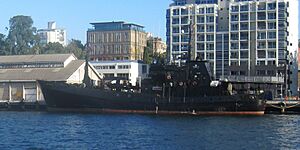
After Paul Watson left Greenpeace, Greenpeace has criticized Sea Shepherd's methods. Greenpeace says Sea Shepherd is a violent group whose tactics could harm fishermen and whalers. They have called Watson an extremist. Greenpeace also believes that Sea Shepherd's actions make it easier to call anti-whaling groups "dangerous terrorists." This could make it harder to end whaling in Japan.
In March 2014, a court ruled that Japan's whaling program was not for scientific reasons. The court ordered Japan to stop issuing permits for whaling. In response, Japan reduced its annual whaling from 915 to 333 whales. They now only hunt minke whales. Paul Watson said that Sea Shepherd's actions were a big reason for Japan's decision.
In 2017, Sea Shepherd announced they would stop sending ships to the Antarctic Ocean to chase Japanese whalers. This was because Japan started using more military surveillance satellites and passed new anti-terrorism laws. These new laws made it a terrorist offense for eco-activist ships to be near whalers. Sea Shepherd felt they could not compete with Japan's advanced technology.
Sea Shepherd in the Media
Sea Shepherd is known for being good at using the media to share its message. They work with journalists and send out press releases during their campaigns.
Paul Watson has used media attention to highlight their work. For example, in an episode of Whale Wars, he created a "media storm" when two Sea Shepherd crew members were held on a Japanese whaling ship. Watson has said that they give the media exciting stories to bring attention to what is happening to whales, seals, and sharks.
Sea Shepherd has also used satellites, webcams, and online blogs during their missions. They have invited media to join them on their ships. In 2006, representatives from a TV network and a magazine, along with filmmakers, joined the group. The TV series Whale Wars showed Sea Shepherd's 2008-2009 campaign against Japanese whalers. The show premiered in 2008 on Animal Planet.
Many famous people have given money to Sea Shepherd or supported them. These include TV personalities, actors, and musicians. For example, Bob Barker donated $5 million. Actors like Martin Sheen, Daryl Hannah, and Pamela Anderson have joined protests or spoken for the group. In 2007, actor Heath Ledger started a music video to raise awareness about whale hunts. After he passed away, others finished it, and money from its sales went to Sea Shepherd.
Music artists like Anthony Kiedis of the Red Hot Chili Peppers and the band Gojira have also supported Sea Shepherd financially. Companies like Lush cosmetics have partnered with Sea Shepherd to raise awareness about shark finning.
In Tasmania, Sea Shepherd has been banned from a boat festival. This is because the festival wants to celebrate old maritime history, not current ocean issues.
For many years, Mexico relied on Sea Shepherd to remove illegal nets that trap vaquita porpoises. In January 2021, Sea Shepherd had to leave the Gulf of California after a fisherman attacked one of their vessels. One fisherman died in the attack. Mexico has invited Sea Shepherd back to help save the vaquita, but they cannot remove nets anymore.
Sea Shepherd's Fleet of Ships
Sea Shepherd calls its ships "Neptune's Navy." As of 2021, they operate 12 ships. These include the Ocean Warrior, Brigitte Bardot, Bob Barker, Steve Irwin, Sam Simon, John Paul DeJoria, Farley Mowat, Sharpie, Jairo Mora Sandoval, White Holly, Martin Sheen, and Sea Eagle.
The Steve Irwin ship was bought in 2007. It was named after the famous wildlife expert Steve Irwin. His wife, Terri Irwin, supported Sea Shepherd. She said Steve cared deeply about whales. The Bob Barker ship was named after the TV host Bob Barker, who donated $5 million to buy it. In 2010, the Bob Barker crashed with a Japanese whaling vessel, causing damage to its hull. In 2014, the Bob Barker chased an illegal fishing vessel for 110 days, covering over 10,000 nautical miles. This was the longest chase in sea history.
Sea Shepherd also used to operate other ships, like the Farley Mowat and the Ady Gil. The Ady Gil sank after crashing with a whaling security vessel in 2010.
For their 2010-2011 campaign, Sea Shepherd got the Ocean 7 Adventurer. It was later renamed Gojira and then MV Brigitte Bardot. For the 2011-2012 campaign, they used drone aircraft to help find whaling ships.
In 2012, Sam Simon, a co-creator of The Simpsons, donated money to buy a fourth vessel. This ship, a former Japanese weather survey vessel, was named the MY Sam Simon.
In 2014, actor Martin Sheen helped launch Sea Shepherd's newest vessel, the R/V Martin Sheen, named in his honor. This ship is used for research and direct action.
In 2015, Sea Shepherd bought two old Coast Guard patrol boats. One was named MY Farley Mowat, and the other was named MV John Paul DeJoria. In 2017, they got a third patrol boat, named MV Sharpie. It joined a mission to help save the endangered vaquita porpoise.
Sea Shepherd's ships have flown flags from different countries. Some countries, like Canada and Belize, have taken away their ship registrations. The Steve Irwin and Bob Barker now sail under the Dutch flag. The Netherlands considered taking away their registrations but decided not to.
Sea Shepherd in Books and Shows
Sea Shepherd's campaigns have been shown in various documentaries and TV series. These include the Netflix documentary Seaspiracy, the TV series Whale Wars, and Ocean Warriors. Many books have also been written by current and past members of Sea Shepherd. Some of these books are:
- Laura Dakin, Cookin' Up a Storm: Stories and Recipes from Sea Shepherd's Anti-Whaling Campaigns (2015)
- Raffaella Tolicetti, Think! Eat! Act!: A Sea Shepherd Chef's Vegan Cookbook (2014)
- Laurens de Groot, Hunting the Hunters: At War With the Whalers (2014)
- Rik Scarce, Eco-Warriors: Understanding the Radical Environmental Movement (2005)
- Paul Watson, Seal Wars: Twenty-five Years in the Front Lines with the Harp Seals (2003)
- Paul Watson, Ocean Warrior: My Battle to End the Illegal Slaughter on the High Seas (1996)
- David B. Morris, Earth Warrior: Overboard with Paul Watson and the Sea Shepherd Conservation Society (1995)
- Paul Watson, Earthforce! An Earth Warrior's Guide to Strategy (1993)
- Paul Watson, Sea Shepherd : My Fight For Whales And Seals (1980)
See also
 In Spanish: Sea Shepherd Conservation Society para niños
In Spanish: Sea Shepherd Conservation Society para niños
- International Convention for the Regulation of Whaling
- Whaling in Japan
- Whaling in the Faroe Islands
- Drift netting
- Shark finning
- Animal rights
 | Georgia Louise Harris Brown |
 | Julian Abele |
 | Norma Merrick Sklarek |
 | William Sidney Pittman |


